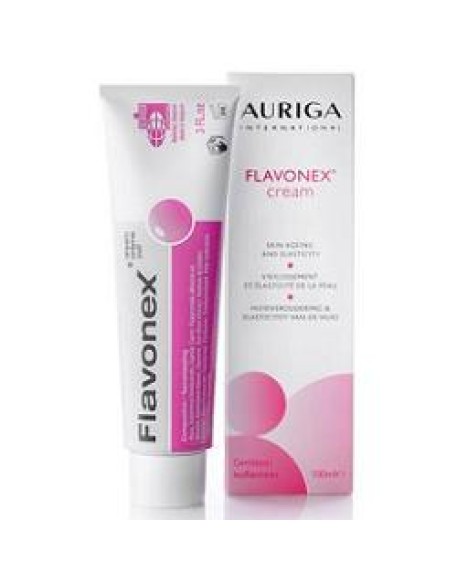Viso

FLAVONEX CREAM 100 ML
- Produttore: ADVANCED MED.AEST.SOL. SRL
- Codice prodotto: 937495339
- Punti fedeltà: 48
- Disponibilità: Articolo esaurito
€ 43,61
- € 49,00
- Prezzo in punti fedeltà: 2450
FLAVONEX
cream
Riduce l'invecchiamento cutaneo e aumenta l'elasticità cutanea di viso, collo, décolletè e del corpo.L'applicazione di FLAVONEX, due volte al giorno, apporta alla pelle i fito-ormoni necessari a stimolare la produzione di collagene ed elastina che, di conseguenza, permettono di preservare e migliorare l'elasticità e la densità del tessuto cutaneo del corpo e del viso.
Modalità d'uso
Applicare due volte al giorno sulla pelle perfettamente detersa. Applicare in particolare su viso, collo, décolletè, seno, addome ed interno cosce.
Componenti
Aqua; isostearyl isostearate; caprilyl capric triglycerides; mineral oil; diethylene glycol; glycerin; soybean extract; sodium acrylates; acryloyl dimethyltaurate copolymer; carbomer; triethanolamin; polyisobutene; caprilyl capryl glucoside.
Formato
Tubo da 100 ml.
Cod. 2240265
Bibliografia
- Murkies (A.L.), Lombard (C.), Strauss (B.J.G.), Wilcox (G.), Burger (H.G.) and Morton (M.S.), “Dietary flour supplementation decreases post-menopausal hot flushes : Effect of soy and wheat.”, Maturitas n° 21, 1995, p. 189-195.
- Brzezinski (A.), Adlercreutz (H.), Shaoul (R.), RÖSler (A.), Shmueli (A.), Tanos (V.) And Schenker (J.G.), “Short term effects of phytoestrogen-rich diet on postmenopausal women.”, Journal of the North American Menopause Society n° 2, 1997, p. 89-94.
- Albertazzi (P.), Pansini (F.), Bonaccorsi (G.), Zanotti (L.), Forini (E.), De Aloysio (D.), “The effect of dietary soy supplementation on hot flushes.”, Obstetrics & Gynecology, Vol. 91 n° 1, 1998, p. 6-10.
- Duffy (M.J.), Maguire (T.M.), Hill (A.), Mcdermott (E.) and O'higgins (N.), “Metalloproteinases : role in breast carcinogenesis, invasion and metastasis.”, Brest Cancer Res., n° 2(4), 2000, p. 252-257.
- Nagavarapu (U.), Relloma (K.) And Herron (G.S.), “Membrane Type 1 matrix metalloproteinase regulates cellular invasiveness and survival in cutaneous epidermal cells.”, Journal of Investigative Dermatology, n° 118, 2002, p. 573-581.
